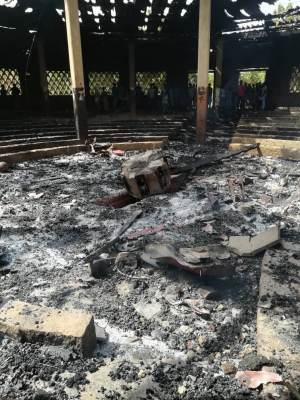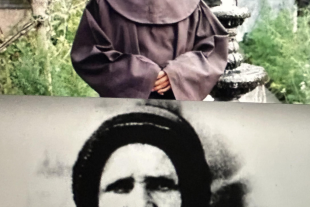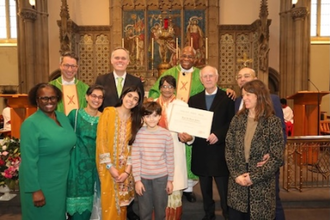From Soweto to Kumba, Children in the Line of Fire

Burnt Church in Cameroon © ACN
On 16 June 1976, more than 20,000 South African children marched to protest against the policies of the Apartheid regime. Police responded to the peaceful demonstration with tear gas and bullets, killing hundreds (estimates range from 176 to 700 dead). Many reading ICN now may have joined the global campaign against Apartheid as a result of the Soweto massacre, as I did.
Today, the UN's International Day of the African Child is dedicated to the memory of Soweto. Yet, the continent's youth are still in the line of fire, whether recruited as child soldiers or targeted in conflicts in which those carrying guns are indifferent to the suffering they cause.
On June 6 this year, another group of African children marched in Cameroon's capital city Yaoundé, demanding the right to live normal lives, without the fear of violence. It is estimated that nearly a million children in the country's Anglophone regions have been kept out of school for five years by a boycott enforced by separatist fighters. The various non-state armed separatist groups fighting the Cameroon regime demand that English-speaking parents stop their offspring from attending schools teaching a curriculum determined by Cameroon's government. The separatists allege that institutions and representatives of Yaoundé are an occupying force in their territory, which they seek to make an independent country they call "Ambazonia."
The school boycott is part of a wider separatist campaign against the Francophone-dominated regime of President Paul Biya, 89, who has been in power since 1982. Freedom House ranks Cameroon's elections as neither free nor fair, and Transparency International considers its administration to be among the world's most corrupt. In addition, Amnesty International has recorded dozens of instances of peaceful opposition figures being imprisoned.
The Anglophone conflict has become increasingly deadly after Cameroonian authorities responded to initial peaceful protests in 2016 with disproportionate force. Today, an estimated 1.1 million civilians out of a population of 6 million in the Anglophone regions have fled the violence, becoming internally displaced or crossing the border to Nigeria and beyond. For the fourth year in a row, the Norwegian Refugee Council has ranked the Anglophone Crisis among the world's top three most neglected displacement crises. The Vatican and others have called for inclusive peace talks, and the USA has terminated Cameroon's participation in the African Growth and Opportunity Act as a sign of its dismay with Cameroonian human rights abuses. In 2019, the Cameroon government held a Major National Dialogue, but separatist representatives feared they would be arrested if they attended, and the dialogue did not address root causes of the conflict.
Schools in the Anglophone North West and South West Regions have been attacked and burned, with separatist groups and Cameroon state forces blaming each other. Students have been targeted if they disobey the boycott: in October 2020, seven children were massacred and 12 wounded at Mother Francisca International Bilingual Academy in Kumba. Three months later, a Catholic school in Kungi was attacked and burned. Human Rights Watch reports that in the same year, a schoolgirl in Buea was kidnapped by separatists who chopped off one of her fingers as a punishment and warning to others. She was released after a ransom was paid.
The 'Cameroon Anglophone Crisis Database of Atrocities' has researched and catalogued further attacks. Their joint report with Bellingcat has video images of children fleeing schools in terror while armed men yell that they will be punished if they attend class. Teachers are also harassed, kidnapped, extorted and worse. Although Cameroon signed the Safe Schools Declaration, civilians complain that the government is not protecting schools or hospitals, which are also targeted by all sides. (On 8 June, the Mamfe District Hospital in the South West Region was burned to the ground, depriving 85,000 people of healthcare).
The 2016 peaceful demonstrations that started the conflict included Anglophones protesting against the imposition of French-speaking teachers in their Anglo-Saxon schools. This is similar to the spark that ignited the Soweto protests, when the Apartheid government demanded that Afrikaans be taught alongside English.
Last week in Washington, DC, the Robert F. Kennedy Human Rights Award 2022 was awarded to two prominent peace campaigners from Cameroon: Felix 'Agbor Balla' Nkongho and Maximilienne Ngo Mbe. Barrister Agbor Balla, the President of the Centre for Human Rights and Democracy in Africa (CHRDA), was a leader of protests at the beginning of the Anglophone Crisis. He was imprisoned for eight months by the Cameroonian government. Since his release, he has continued to advocate against violence and called for schools to safely reopen. He says: "We are perpetuating a vicious cycle of poverty in such a way that the kids who cannot afford an education, because their parents cannot afford an education, will end up being the lowest of society."
Lord Alton and other prominent figures have repeatedly urged the British government to use its relationship with President Biya and Anglophone Cameroon to press the Yaoundé authorities to announce a road map toward inclusive peace negotiations, including confidence-building measures, such as releasing political prisoners.
Restoring education can also be a point to build confidence, and the children of Cameroon - like those of Soweto - demand it. On this International Day of the African Child, let children be children, and let them be educated without fear of attack.
















